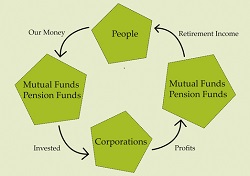|
People, Profits, & Pensions |
|
Should Texas teachers shout Yahoo?
Wednesday, January 29, 2014
Texas teachers were among the owners affected when Yahoo! announced its fourth quarter and full year earnings for 2013, after the close of markets yesterday. The Teacher Retirement System of Texas (TRS) owned 1,393,802 shares of Yahoo! at the close of trading on September 30, 2013 (data in this paragraph from nasdaq.com). About 70% of Yahoo! stock is owned by institutional investors, which means mainly working, middle class people. Whether any of the owners shouted Yahoo! over the company's financial results depends on who you ask. In a company news release, CEO Marissa Mayer said, "I'm encouraged by Yahoo's performance in Q4 and 2013 overall. We saw continued stability in the business, and our investments allowed us to bring beautiful products to our users and establish a strong foundation for revenue growth,". Yahoo's price was down about 7% two hours after Wednesday morning's opening. Rex Crum of MarketWatch says, "... the main issue investors keyed on was a 6% drop in Yahoo’s display-ad revenue, which was bigger than consensus estimates." The Teacher Retirement System of Texas website says on its website (January 29, 2014), "The agency serves 1,335,402 participants – 1,003,655 are public and higher education members, and 331,747 are retirement recipients. As of April 17, 2013, System net assets totaled $117.5 billion."
The Bigger Picture:Will Profits from Big Macs Add to Your Retirement Income?In 1948, the McDonald brothers redesigned and remodelled their drive-in restaurant in San Bernardino, California. Taking inspiration from Henry Ford's assembly-line, they created the fast food revolution, with the quick service and low prices we now take for granted. In that same year, the U.S. National Labor Relations Board ruled unions could include pension issues in contract negotiations. That ignited a massive expansion of pension plans. In the 1950s, pension funds started buying stocks, rather than just bonds or their equivalents; in addition mutual funds came of age. With these two developments working, middle class people became owners of big business. At first, their stakes were modest, but steadily growing. And in just a few decades, they gained controlling interests in many large corporations through their funds. Management guru Peter Drucker has called it, "...one of the most startling power shifts in economic history." Now, working people reap the benefits of those investments, collecting much of the profit distributed by McDonald's and other big corporations. Discover how the pieces fit together. In Big Macs & Our Pensions: Who Gets McDonald's Profits? - a new booklet -(about 25-pages), you will:
You may not be among the owners of McDonald's. But if you belong to any pension plan, or contribute to a mutual fund or whole life insurance policy, you likely own pieces of some big corporations. More importantly, though, your retirement income will be bigger and grow more dependably than you would otherwise expect. Big Macs & Our Pensions: Who Gets McDonald's Profits? is now available at Amazon.com
|

The Ownership Cycle
Copyright 2014. Robert F. Abbott, All Rights
Reserved.
|

 By: Robert F. Abbott, author of
By: Robert F. Abbott, author of